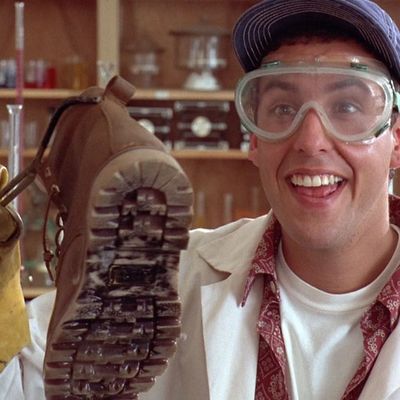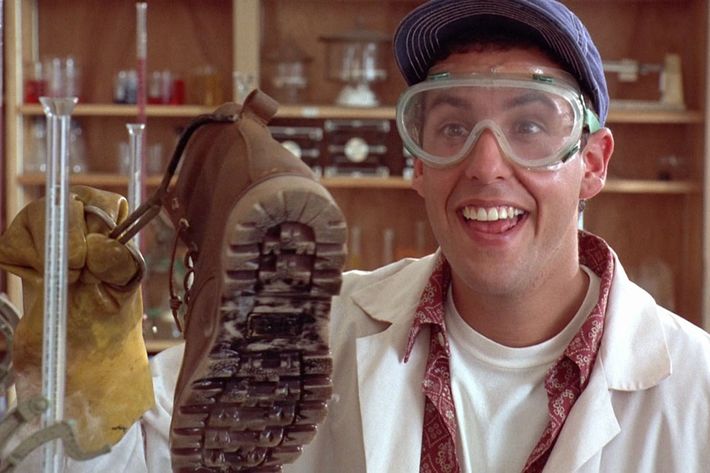

The Nostalgia Fact-Check is a recurring Vulture feature in which we revisit a seminal movie, TV show, or album that reflexively evinces an ÔÇ£Oh my God, that was the best ever!ÔÇØ response by a certain demographic, owing to it having been imprinted on them early. Now, years later, we will take a look at these classics in a more objective, unforgiving adult light: Are they really the best ever? How do they hold up now? WeÔÇÖve already reconsidered Heathers, Ally McBeal, Ace of BaseÔÇÖs The Sign, Ghostbusters, Dinosaurs, and DisneyÔÇÖs The Little Mermaid. Our latest installment: Adam SandlerÔÇÖs mid-ninties oeuvre: Billy Madison, Happy Gilmore, TheyÔÇÖre All Gonna Laugh at You, and What the Hell Happened to Me?
Background: Adam Sandler made a name for himself with boyish, often idiotic characters during his four seasons as a performer on Saturday Night Live. But early nineties SNL isnÔÇÖt exactly the showÔÇÖs heyday: SandlerÔÇÖs last season on the show, 1994ÔÇô95, was the focus of a New York story called ÔÇ£The Inside Story of the Decline and Fall of Saturday Night Live,ÔÇØ and SandlerÔÇÖs first major film, 1995ÔÇÖs Billy Madison, wasnÔÇÖt much better received, critically or at the box office. (Time called it ÔÇ£one of the most execrable movies ever made.ÔÇØ It made $25.5 million.) His second movie, Happy Gilmore, was similarly critically maligned, but praise or no, SandlerÔÇÖs 1993 comedy album TheyÔÇÖre All Gonna Laugh at You went double platinum, as did its follow-up, 1996ÔÇÖs What the Hell Happened to Me? Since their initial release, Billy Madison and Happy Gilmore (and similar fare like Tommy Boy) have become beloved near classics, thanks in part to frequently being on cable, but also owing to the filmsÔÇÖ quotability and SandlerÔÇÖs sustained star power.
Nostalgia Demo: People exposed to SandlerÔÇÖs iconic characters (Operaman) and bits (The Talking Goat) before their 15th birthdays. Billy Madison and Happy Gilmore continually attract new fans, but album devotees were most likely born between 1979 and 1986.
Nostalgia Fact-Check: As a kid and a teenager, I didnÔÇÖt have a favorite band or a favorite album. Those images of 13-year-olds stomping into their rooms and blasting rock music? That wasnÔÇÖt me at all. I was much more likely to stomp into my room and blast ÔÇ£The Severe Beating of a High School Spanish TeacherÔÇØ from TheyÔÇÖre All Gonna Laugh at You (for some reason, the pathetically whimpered ÔÇ£bibliotecaÔÇØ still gets me). Other middle schoolers fixated on ÔÇ£All ApologiesÔÇØ; I fixated on ÔÇ£At a Medium Pace.ÔÇØ Every time I put on a sweatshirt, I still say, ÔÇ£I love you swea-he-hetshirt!ÔÇØ; when I hear someone say ÔÇ£WeÔÇÖre sorry,ÔÇØ I immediately fill in the ÔÇ£just kidding ÔÇö you suck!ÔÇØ I remember what I was wearing when I saw Billy Madison for the first time. Adam Sandler was the funniest person on earth.
Which is why my heart breaks a little to report that these albums donÔÇÖt hold up anywhere near as well as the films do. Billy Madison has aged surprisingly well. SandlerÔÇÖs drunken, delusional, purposeless man-child delighted me in my adolescence and delights me now. Entertainment Weekly gave the film a D when it came out, and most critics agreed that SandlerÔÇÖs high-pitched gibberish and affection for shouting were not the stuff of leading men. If that was true then, it certainly isnÔÇÖt now: Will FerrellÔÇÖs film career and a great deal of Judd ApatowÔÇÖs material works fits perfectly in the Sandlerlian genre of buffoon-makes-good. Billy Madison is dopey in almost every way, and no one seems bothered by the fact that Billy never expresses any interest in college or business school, but its laugh lines still work and its quotability has not diminished at all. Stop looking at me, swan!
Happy Gilmore contains more rage than Billy Madison, which is where it goes slightly awry. Billy is a vaguely noble hero who eventually acknowledges his own shortcomings, and, through the process of education and self-betterment, manages to woo the future Mrs. Pete Sampras. Happy, ironically, is more volatile and dramatically less lovable. HeÔÇÖs driven by frustration and desperation, whereas Billy is driven by the desire to become a worthy heir to his fatherÔÇÖs company. Billy Madison was always better than Happy Gilmore (fighting words!), but the gap seems to have widened over the years. Arrested-development humor is as popular today as itÔÇÖs ever been, while rage humor has fallen sort of out of fashion. The Bob Barker brawl that was once Happy GilmoreÔÇÖs pi├¿ce de r├®sistance doesnÔÇÖt stand out anymore.
Gilmore, though, still has its charms (ÔÇ£Are you too good for your home?ÔÇØ). TheyÔÇÖre All Gonna Laugh at You and What the Hell Happened to Me?, though, are excruciating. Fart jokes are still funny, but ÔÇ£The Hypnotist,ÔÇØ in which a patient and a hypnotist blame one another for a constant stream of flatulence, is over eight minutes long. Has YouTube ruined me for comedy bits longer than three minutes? Perhaps. Or maybe ÔÇ£Sex or Weightlifting,ÔÇØ about guessing, based on sound, whether people are having sex or working out, just doesnÔÇÖt have six minutesÔÇÖ worth of jokes in it. ÔÇ£Fatty McGeeÔÇØ meanders for over three minutes, even though the joke never heightens past the fact that the annoying character Fatty McGee wheezes loudly. Sandler stutters through five ÔÇ£Excited SouthernerÔÇØ tracks on WTHHTM. A high-school janitor, bus driver, science teacher, and Spanish teacher all receive serious beatings on TAGLAY. These albums are staggeringly repetitive.
That makes the bright spots seem even brighter, at least. ÔÇ£The GoatÔÇØ is still wonderfully absurd (ÔÇ£quick goat thinking!ÔÇØ) and ÔÇ£RespectÔÇØ is about as perfect as inappropriate-response humor can get (ÔÇ£Gotta respect the condoms!ÔÇØ). ÔÇ£Toll Booth WillieÔÇØ is filthy and dumb, but itÔÇÖs so filthy and so dumb that it becomes irresistible.
SandlerÔÇÖs style of gleeful crudeness seemed iconoclastic in the early nineties; he said ÔÇ£cock and ballsÔÇØ so many times on the albums the words lost all meaning. But then American Pie and ThereÔÇÖs Something About Mary, and eventually movies like Wedding Crashers and the Apatow canon far out-cruded SandlerÔÇÖs early work. His little-boy pouts and cadences lost some of their charm as Sandler grew up, but rather than shift fully into the more dramatic or serious roles heÔÇÖs shown heÔÇÖs capable of (Punch Drunk Love, Funny People), SandlerÔÇÖs still churning out movies like Grown Ups and Jack and Jill. Those rehashed, middle-of-the-road comedies lack the naughty-kid/class-clown persona that made SandlerÔÇÖs earlier work so primed for teenage adulation. IÔÇÖll be surprised if Sandler ever makes another movie that generates the same kind of affection and devotion Billy Madison and Happy Gilmore once did, but to have made two at all is still pretty impressive. If enduring idiot classics are cool, then call Adam Sandler Miles Davis.

